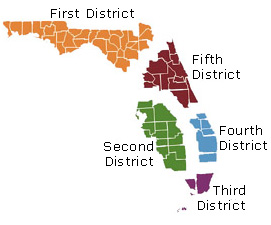 The District Court of Appeal of Florida, Second District, recently reversed a final judgment of foreclosure where a substituted plaintiff failed to prove the original plaintiff had standing when suit was filed.
The District Court of Appeal of Florida, Second District, recently reversed a final judgment of foreclosure where a substituted plaintiff failed to prove the original plaintiff had standing when suit was filed.
In so ruling, the Appellate Court confirmed that it is not enough for a plaintiff to prove standing when the case is tried, it must also prove standing when the complaint was filed.
A copy of the opinion is available at: Link to Opinion.
A mortgagee initiated a residential foreclosure action after borrowers defaulted, and the borrowers responded that the mortgagee lacked standing. An assignee was then substituted as plaintiff and served requests for admissions that the assignee was the owner and holder of the note and mortgage, which the borrowers failed to answer.
Thereafter, the borrowers twice moved to dismiss alleging the assignee lacked standing because the original mortgagee plaintiff lacked standing at the time suit was filed, which the trial court denied.
The trial court held a bench trial wherein the assignee’s account representative testified, but did not provide testimony regarding the original mortgagee plaintiff’s entitlement to foreclosure when suit was filed.
The borrowers again moved to dismiss for lack of standing at the close of the assignee’s case. The trial court denied the motion and granted judgment in favor of the assignee, and the borrowers appealed.
The Appellate Court reversed the judgment and held the assignee failed to prove that the original mortgagee plaintiff had standing when filing suit.
As you may recall, in Florida and other states, a foreclosure plaintiff is required to show that it is the holder of the note or a person acting on behalf of the holder. If the foreclosure plaintiff is not the original lender, it may establish standing by submitting a note with a blank or special indorsement, an assignment confirming the transfer of rights to enforce the note, or with a sworn statement otherwise demonstrating the plaintiff’s status as the person entitled to enforce the note.
In addition, a plaintiff that is not a holder, such as a mortgage servicer, can establish standing through proof that it is authorized to enforce the note on behalf of the holder.
The Appellate Court held that the action was indistinguishable from Russell v. Aurora Loan Servs., LLC, 163 So. 3d 639 (Fla. 2d DCA 2015), in which a substituted foreclosure plaintiff failed to show that an original plaintiff servicer had standing either as a holder or as a servicer authorized by the holder to enforce the note.
The Appellate Court also rejected the assignee’s argument that the borrower’s failure to respond to requests for admissions regarding the assignee’s status as owner and holder of the note and mortgage proved its standing. According to the Court, such admissions, at most, only proved that the assignee had standing when suit was filed, not the servicer.
Accordingly, the Appellate Court reversed final judgment in favor of the assignee, and remanded with instructions to enter an order of involuntary dismissal.

